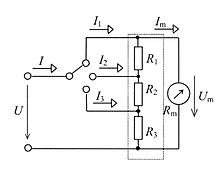Ayrton shunt

Ayrton shunt or universal shunt is a high-resistance shunt used in galvanometers to increase their range[1] without changing the damping.[2] The circuit is named after its inventor William E. Ayrton.[3] Multirange ammeters that use this technique are more accurate than those using a make-before-break switch.[4] Also it will eliminate the possibility of having a meter without a shunt which is a serious concern in make-before-break switches.[5]
The selector switch changes the amount of resistance in parallel with Rm (meter resistance). The voltage drop across parallel branches is always equal. When all resistances are placed in parallel with Rm maximum sensitivity of ammeter is reached.[5]
Ayrton shunt is rarely used for currents above 10 amperes.[6]
References
- ↑ Basic Electrical Engg: Prin & Appl 2009, p. 826.
- ↑ Graf 1999, p. 50.
- ↑ "Ayrton shunt". Merriam-Webster, Incorporated. Retrieved 11 January 2014.
- ↑ Herman 2013, p. 201.
- 1 2 Bakshi & Bakshi 2009, p. 3-41.
- ↑ Herman 2010, p. 276.
- Graf, R.F. (1999). Modern Dictionary of Electronics. Electronics & Electrical. Newnes. ISBN 9780750698665. Retrieved 2014-01-11.
- Basic Electrical Engg: Prin & Appl. McGraw-Hill Education (India) Pvt Limited. 2009. ISBN 9781259081330. Retrieved 2014-01-11.
- Herman, S. (2013). Electrical Studies for Trades. Cengage Learning. ISBN 9781133278238. Retrieved 2014-01-11.
- Bakshi, U.A.; Bakshi, A.V. (2009). Electrical Instrumentation. Technical Publications. ISBN 9788184317336. Retrieved 2014-01-11.
- Herman, S. (2010). Delmar's Standard Textbook of Electricity. Cengage Learning. ISBN 9781111539153. Retrieved 2014-01-11.